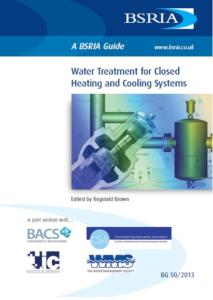BSRIA Water Treatment for Closed Heating and Cooling Systems
BSRIA Water Treatment for Closed Heating and Cooling Systems
BSRIA Water Treatment for Closed Heating and Cooling Systems is for the control of corrosion and maintenance of water quality in closed heating and cooling systems in buildings other than individual dwellings. This includes low temperature hot water heating systems, heat pump and chilled water systems and condenser water circuits.
The treatment of water in modern closed heating and cooling systems is essential for the avoidance of microbiological fouling (biofouling), corrosion and scale. These problems can result in energy wastage, poor system performance, and the need for early replacement of plant and components. The consequences of inappropriate or non-existent water treatment can sometimes be disastrous.
This scope does not include water treatment for open systems such as cooling towers and steam boilers or for domestic hot and cold water
services.
- The objectives of a water treatment programme in closed heating and cooling systems are to:
- maintain the system in a clean condition
- assist in maintaining system efficiency
- prolong system life
You can also read BSRIA Building Manuals and Building User Guides
BSRIA Water Treatment for Closed Heating and Cooling Systems
- INTRODUCTION
![BSRIA Water Treatment for Closed Heating and Cooling Systems]()
- SYSTEM DESIGN AND OPERATION
- CORROSION PROCESS
- CHEMICAL WATER TREATMENT
- NON CHEMICAL WATER TREATMENT
- MANAGEMENT OF THE WATER TREATMENT PROGRAMME
- REGULATIONS
- A:USE OF TEMPORARY PUMPS
- B:CASE STUDIES
- C:BIOCIDES
- D:QUANTITATIVE MEASUREMENT OF BIOFILM
- E:ANTI-FREEZE
- GLOSSARY
- REFERENCES AND BIBLIOGRAPHY
This guide is intended for use by design engineers, installing contractors and the maintenance staff responsible for looking after the completed systems. It provides an introduction to current theory and practice of water treatment in closed systems including minimising the risk of corrosion through system design features and proactive monitoring.
There are many factors in the design of closed heating and cooling systems that can influence corrosion. It is impossible to completely eliminate the corrosion of ordinary metals in such systems, but it is possible to control the corrosion rate to tolerable levels.


Comments are closed.